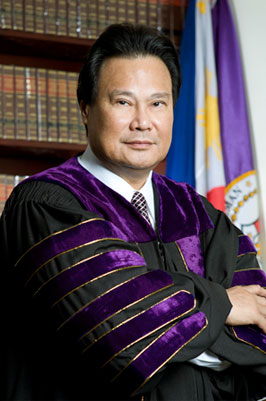News
Sandiganbayan affirms ruling putting ex-CJ Corona on trial for perjury

Dismissed Chief Justice Renato Corona. (Wikipedia photo)
MANILA – The Sandiganbayan has affirmed its earlier ruling finding probable cause to put former Supreme Court (SC) Chief Justice Renato C. Corona on trial for perjury and violation of Republic Act No. 6713 or the “Code of Conduct for Public Officials and Employees,” in connection with his alleged misdeclaration of assets.
In a 28-page resolution promulgated on Wednesday, the Sandiganbayan Third Division dismissed Corona’s motion for reconsideration (MR), which sought to reverse its August 2015 ruling finding grounds to put him on trial for eight counts of perjury under the Revised Penal Code (RPC) and another eight counts of violation of RA 6713.
The Sandiganbayan said that Corona, in his MR, failed to present any argument apart from those he had already raised in his motion for judicial determination of probable cause.
The Sandiganbayan denied such motion on Aug. 13, 2015.
“The Court finds the motion for reconsideration devoid of merit… To be sure, the aforesaid issues have been previously raised by the accused in his motion for judicial determination of probable cause. They were thoroughly considered and passed upon by the Court in its assailed Resolution,” the Sandiganbayan said.
The Sandiganbayan set Corona’s arraignment for both cases on Jan. 26, 2016 at 1:30 p.m.
Sandiganbayan Presiding Justice and Third Division Chair Amparo Cabotaje-Tang and Associate Justices Alez Quiroz, Jose Hernandez and Ma. Theresa Dolores Gomez-Estoesta voted to deny Corona’s MR.
The three Sandiganbayan justices had earlier voted that there was probable cause to put Corona on trial.
Dissenting was Associate Justice Samuel Martires.
In its new ruling, the Sandiganbayan stood pat that there is sufficient evidence on hand to assume that “more likely than not, the charges had been committed by the accused Corona.”
The Sandiganbayan said that Corona’s other claims about the validity of the pieces of evidence in the case should best be validated in a full-blown trial.
“The validity and merits of a party’s accusation or defense, as well as admissibility of testimonies and evidence, are better ventilated during the trial proper. To repeat, a finding of probable cause needs only rest on evidence showing that, more likely than not, a crime has been committed and that it was committed by the accused,” the Sandiganbayan ruling said.
The cases against Corona, which were filed by the Office of the Ombudsman (Ombudsman) before the Sandiganbayan in April 2014, arose from his alleged misdeclaration of assets in his Statement of Assets Liabilities and Net Worth (SALNs) from 2001 to 2011.
“Wherefore, the Court denies the accused’s motion for reconsideration dated August 27, 2015 for lack of merit and/or for being pro forma,” the Sandiganabayan said.
Corona and his wife Cristina are also facing a Php 130.59-million civil forfeiture case before the Sandiganbayan, which is also in connection with their alleged misdeclarations in their SALNs, respectively.
In 2012, the Senate sitting as Impeachment Court convicted Corona for betrayal of public trust and culpable violation of the Constitution over non-declaration of several assets, including real estate properties in his SALNs.
This led to Corona’s unseating as Chief Justice on May 26, 2012.





















